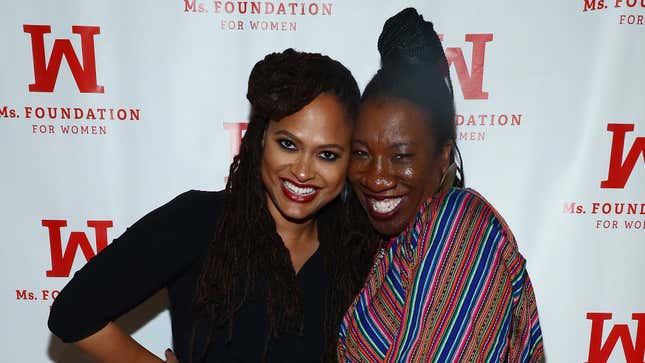
As I write this, there is still a debate waging in one of our comments sections over whether filmmaker Ava DuVernay is obligated to embrace the term “auntie” or not (for the record, we think everyone should embrace whatever term they want). But as #MeToo creator Tarana Burke revealed on Tuesday night, DuVernay took an even more significant and far-reaching stance for and among black women when asked to speak out against entertainer and alleged sexual predator R. Kelly.
As Vulture reports, the revelation came during Burke’s talk with investigative reporter and music critic Jim DeRogatis and writer Jamilah Lemieux about DeRogatis’s new book, Soulless: The Case Against R. Kelly. Burke revisited the open letter published last April by the Women of Color of Time’s Up, which asked several corporations affiliated with Kelly (including Sony Music and Spotify) to divest from the singer following the latest round of decadeslong allegations reported by DeRogatis, in which several parents alleged Kelly was keeping their daughters in a “sex cult.”
Coincidentally, Kelly was arraigned on 11 additional counts of sex-related crimes on Thursday. He has continued to maintain his innocence, even as TMZ reports that his former manager has been indicted for alleged threats to the parents of Jocelyn Savage, one of Kelly’s “girlfriends.”
“We had a Time’s Up situation where the black women in Time’s Up came out in support of #MuteRKelly. What that took is another conversation,” Burke shared. “Prior to that, I had one-on-one conversations with black women in Hollywood and black women in music because folks were doing stories and they wanted a prominent black woman to go on record and talk about it. The only one who would do it was Ava DuVernay. The only one.”
The problem? The overriding influence Kelly had built within the industry; a fact that was intimidating enough to keep several women from taking a stand. “I asked a singer who I didn’t even think could have a connection to him, and she said, ‘Well, I don’t know, because we share some writers,’” Burke said. “Another woman said, ‘I would love to, but the backlash I would get on Twitter, I’m just not ready for it,’” reported Vulture.
With cancel culture still looming large, it’s an understandable moral dilemma; too bad there’s been less concern about canceling Kelly.
You can view the entire conversation below.

